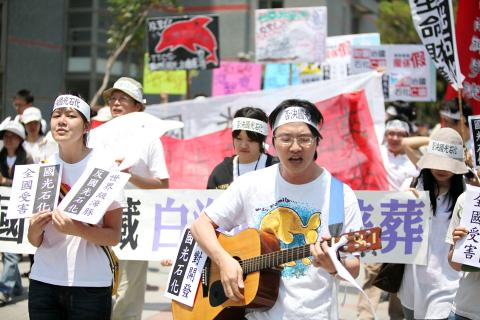The environmental impact assessment (EIA) procedure needs to be overhauled so that controversial projects can be reviewed more thoroughly and political responsibility is more clearly defined, environmentalists said yesterday.
The Environmental Protection Administration (EPA) today will hold its fifth EIA meeting related to a controversial petrochemical project planned by Kuokuang Petrochemical Technology Co for a wetlands area in Changhua County.
Environmental activists have criticized the EIA process, calling its as flawed.

Photo: CNA
Chen Ping-hsuan (陳平軒), spokesperson of the National Youth Alliance Against Kuokuang Petrochemical Project, said members of the EIA committee reviewing the project had come under excessive political pressure because they had the power to veto the project.
Chen said the final decision on the project should not be made based solely on the EPA’s judgment. Instead, the Executive Yuan should convene interdepartmental meetings to weigh a wide range of issues, from environmental protection to economic development.
“It is the Executive Yuan, not the EPA, that should be the gatekeeper of the review process so we know who can be held substantively responsible for the decision,” he said.
Such a broad review was necessary for projects such as the Kuokuang petrochemical complex plan because they could have a substantial impact on all government branches, far beyond the reach of the EPA, the activist said.
Chen also worried that because the EPA has been given de facto veto power by politicians, the EIA committee members would be forced to consider “political issues that are not related to their expertise” because they do not want to upset the authorities.
Chen said the EIA process should rely on more formal formats, such as administrative hearings, rather than the semi-public meetings used at present where comments by committee members are not a matter of public record.
The government has suggested conducting an EIA for the country’s petrochemical industry policy as a whole, an idea that Chao Chia-wei, the coordinator of the Green Citizens’ Action Alliance, believes would be a step forward.
However, he said it should take place before the authorities decided whether to give a nod to the Kuokuang project.

The Grand Hotel Taipei on Saturday confirmed that its information system had been illegally accessed and expressed its deepest apologies for the concern it has caused its customers, adding that the issue is being investigated by the Ministry of Justice Investigation Bureau. The hotel said that on Tuesday last week, it had discovered an external illegal intrusion into its information system. An initial digital forensic investigation confirmed that parts of the system had been accessed, it said, adding that the possibility that some customer data were stolen and leaked could not be ruled out. The actual scope and content of the affected data

DO THEY BITE IT? Cats have better memories than people might think, but their motivation is based entirely around the chance of getting fed Cats can remember the identity of the people who fed them the day before, Taipei-based veterinarians said on Friday, debunking a popular myth that cats have a short memory. If a stray does not recognize the person who fed them the previous day, it is likely because they are not carrying food and the cat has no reason to recognize them, said Wu Chou Animal Hospital head Chen Chen-huan (陳震寰). “When cats come to a human bearing food, it is coming for the food, not the person,” he said. “The food is the key.” Since the cat’s attention is on the food, it

A New York-based NGO has launched a global initiative to rename the nation’s overseas missions, most of which operate under the name "Taipei," to "Taiwan Representative Office (TRO)," according to a news release. Ming Chiang (江明信), CEO of Hello Taiwan, announced the campaign at a news conference in Berlin on Monday, coinciding with the World Forum held from Monday through Wednesday, the institution stated in the release. Speaking at the event, Democratic Progressive Party Legislator Huang Jie (黃捷) said she believed this renaming campaign would enable the international community to see Taiwan

TOO DANGEROUS: The families agreed to suspend crewed recovery efforts that could put rescuers in danger from volcanic gases and unstable terrain The bodies of two Taiwanese tourists and a Japanese pilot have been located inside a volcanic crater, Japanese authorities said yesterday, nearly a month after a sightseeing helicopter crashed during a flight over southwestern Japan. Drone footage taken at the site showed three bodies near the wreckage of the aircraft inside a crater on Mount Aso in Kumamoto Prefecture, police and fire officials said. The helicopter went missing on Jan. 20 and was later found on a steep slope inside the Nakadake No. 1 Crater, about 50m below the rim. Authorities said that conditions at the site made survival highly unlikely, and ruled